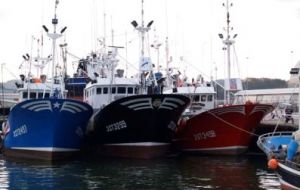MercoPress. South Atlantic News Agency
Uruguay concerned with labour demands and fishing vessel seizures in Montevideo
 Over seventy foreign flagged fishing vessels operate from Montevideo
Over seventy foreign flagged fishing vessels operate from Montevideo Alleged labour disputes involving hundreds of thousands of US dollars have left seven Spanish fishing vessels legally stranded in Montevideo, threatening the reputation of Uruguay’s main port to continue as a South Atlantic fisheries hub.
The issue has become so serious that it was brought up in one of the latest cabinet meetings by the minister of Agriculture, Livestock and Fisheries. The Legislative Transport and Fisheries committees are scheduled to begin an informative round with the different players and a delegation from the industry and unions related to port activities visited the Supreme Court where they exposed the situation before the magistrates.
Apparently two young solicitors, one from Chile and the other from Uruguay have managed to gain the trust of mostly Peruvian fishermen contracted by Spanish and other foreign flag companies operating from Montevideo and have initiated a series of labour demands, involving up to half a million US dollars, forcing the seizure of vessels that are immobilized for months with huge losses.
“This is plain extortion; although it’s all legal, the labour solicitors have found a legal gap which in practical terms is a ‘legal extortion’ forcing companies to loose huge amounts while the reputation of Montevideo crumbles”, argues Mario Baubeta, president of the Centro de Navegación.
Alberto Díaz president of the Uruguayan National Administration of Ports said the matter is “a threat” for the port of Montevideo and “we have begun contacts with all parties concerned with what is happening”.
“The risk and costs of seizures is enormous. We have a report on the importance of the fisheries activities in the port of Montevideo and other ports and the consequences if this situation continues”, said Díaz who anticipated that Parliament is already working of the issue after it was considered at an Executive cabinet meeting.
Last week a delegation from the Centro de Navegación, members of Parliament, union leaders and representatives from the Administration of Ports was received at the Supreme Court. Chief Justice Jorge Chediak listened and said he would be consulting with his peers.
Jorge Pozzi, member of Parliament from the ruling coalition said that the concern is not only limited to the fisheries sector, but to other related activities. He mentioned for example the fact that local companies make the cardboard and other materials for the shipping of fish produce to Spain.
“Demands are totally disproportionate; we have seven vessels seized at the moment, and this stimulates other fishermen to begin demands”, underlines Baubeta, which also means there “is not legal certainty for operations in the port of Montevideo. Nobody is going to come to risk falling in a trap”.
Baubeta said that one of the possible solutions is to make labour trials speedier, “but at the moment these courts are over-worked and saturated with all sort of cases”. Furthermore these solicitors pay the fishermen a few dollars and make them sign a legal paper to act in their name and which they manage at their will: a real legal extortion”.
Diaz from the ports authority and Baubeta agree that fisheries are one of the most dynamic industries for on shore activities since it creates many indirect jobs.
“We have 70 Spanish vessels operating from Montevideo and that only means at least four million US dollars annually”, said Baubeta. But if a solution is not found to the seizures, there is much competition in the region and other ports and terminals are ready to take over be it for the unloading and packaging or simply for transhipment.
Diaz mentioned Rio Grande in southern Brazil as the great competitor waiting to move in and receive the disappointed and frustrated fishing vessels now operating in Montevideo.
“At this rate we are the only losers. We must improve services, the legal framework. Transhipment is money and costs, so if it’s cheaper somewhere else, that is where they will head”, warned Diaz.




Top Comments
Disclaimer & comment rulesCommenting for this story is now closed.
If you have a Facebook account, become a fan and comment on our Facebook Page!